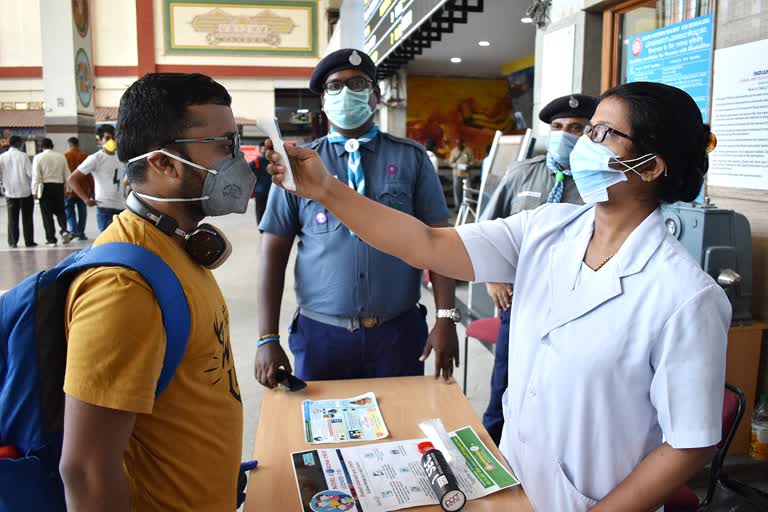New Delhi: With nearly 400 positive cases and number of deaths getting closer to ten in India, the threat from COVID-19 is now very real.
We may not be able to understand its complete impact on our lives and economy. But we definitely know that it is going to be very far reaching, throwing our economy into turmoil.
Till Prime Minister Narendra Modi's broadcast on March 19, the whole country was not even aware that the COVID-19 pandemic is a real challenge that affects every citizen.
A day after successful Janta curfew on March 22, Modi has had to even ask the state governments to ensure the rules of lockdown are followed properly.
Nationwide lockdown
The coming days are bound to see India fighting one of its worst battles since the independence.
Governments of the day, Centre, States and Local Authorities, are in compulsion to enforce complete lockdown to prevent the cycle of transmission of the disease.
Economy and checking the spread of the disease are inter-connected. When nobody comes out of home, no business functions and everything is at a standstill, then there is lesser way of the disease jumping from one person to another.
But it is bound to hit hard on the economy. The lesser the harshness of the health measures, the less will be the economic consequences at least in the short term.
Yet, human lives are more valuable than economic gains.
So far, the Central government is trying to strike the right balance between safeguarding lives and safeguarding people's livelihood.
People always look to the government to show the way in moments of crisis and panic.
Also Read: Big relief: Most of compliance dates for GST and Income Tax returns extended to June end
If the disease is contained by mid-May, things will be manageable, say officials and business leaders.
In case, it takes longer, then the disruptions in the economic activity can cast a shadow on the next fiscal too.
The PM has announced setting up of a task force under Finance Minister Nirmala Sitharaman to assess the negative impact and come up with a relief package for every sector that is set to face a severe crisis.
Indian markets are already seeing heavy hammering of the stocks with steep fall in indices every day.
Economists say a single day of a complete shutdown means zero production of goods and services involving Rs 50,000 crore of real GDP.
A 10-day shutdown could work out to be Rs 5 lakh crore or 3.4 percent of GDP.
Sectoral Impact
As the government prepares a macro stimulus blueprint for relief, each major industry has its own set of issues and problems to be solved. Only when the shutdown ends, the impact across various sectors can be calculated.
We know that the agriculture sector has been in a very delicate state today as this is the beginning of the Rabi harvest season.
With the lock down in force, there is a possibility of disruption in supplies, affecting the income of farmers.
Manufacturing sector is preparing for serious supply chain issues due to shortages in the supply of raw materials.
Industries like steel and cement may be hit if the government's budget gets fully diverted from infrastructure activities to meet relief needs.
Services sectors are seen as the driving force for the Indian economy when investment activity is dull. But today, these sectors, including aviation, hotels, restaurants, tourism, retail malls and entertainment are the ones that have really taken a big blow due to the outbreak of the disease.
Need for targeted income support
What about more vulnerable segments of the informal economy? Should the government drop all principles of fiscal discipline and deficit ratio and give out cash benefits to protect the livelihood of people? How much sacrifice are citizens prepared for?
Indian industry leaders, who interacted with the Prime Minister over video conferencing recently, requested a package of about ₹2-3 lakh crore to provide direct cash transfer to millions of people belonging to the unorganized sector.
These people have lost their jobs because of the crisis triggered by the Covid-19 outbreak.
As the PM keeps appealing to the industry and businesses neither to lay off workers nor cut their salaries, the government’s own focus will be to keep up the payments of salaries and pensions, and funding of unemployment programmes.
At the same time, the government will not be able to force the private sector to pay salaries when income has gone down.
This is where the government has to step in with aggressive compensation programmes involving cash transfers.
Besides seeking a three-month moratorium on all loan payments, industrialists asked the government to transfer cash into the bank accounts of those earning below ₹5 lakh a year.
They requested the PM to consider giving all citizens cash through direct benefit transfer to their accounts.
While those below 25 years of age can be given a one-time payment of ₹5,000, senior citizens above 65 years of age can be given ₹10,000, the Confederation of Indian Industry (CII) recommended to the Prime Minister.
In a nutshell, cash transfers, subsidized food, the extension of debt service tenure, access to free medical facilities, lowering the prices of important drugs, are doable things.
Can India afford such a measure, especially since revenue collections are likely to fall dramatically with the truncation of economic activity? The government will, of course, have to take a call urgently.
As they say, these are exceptional situations and need extraordinary measures. There are no precedents to guide the government.
(Shekhar Iyer is a Delhi-based journalist. Views are personal.)



